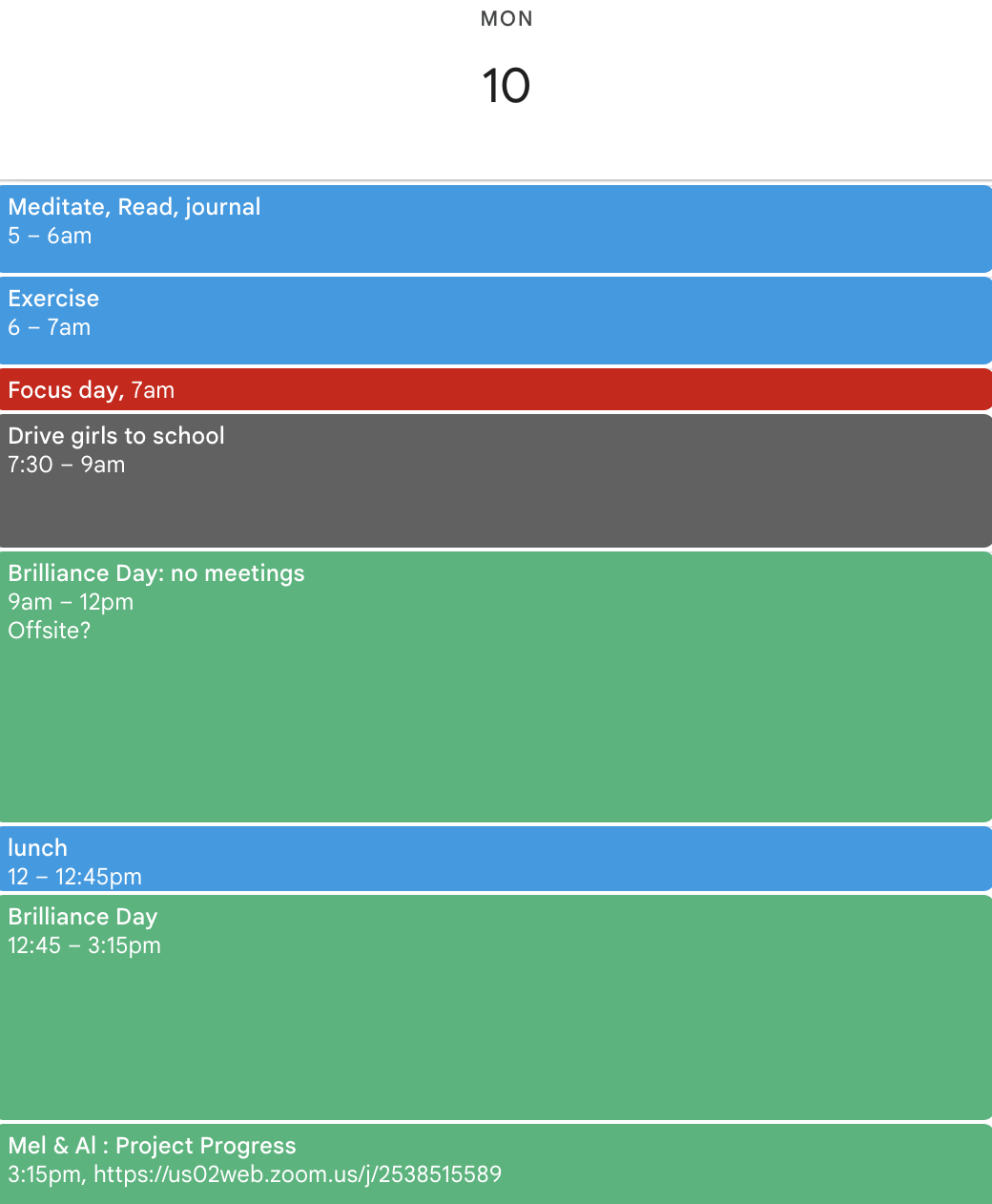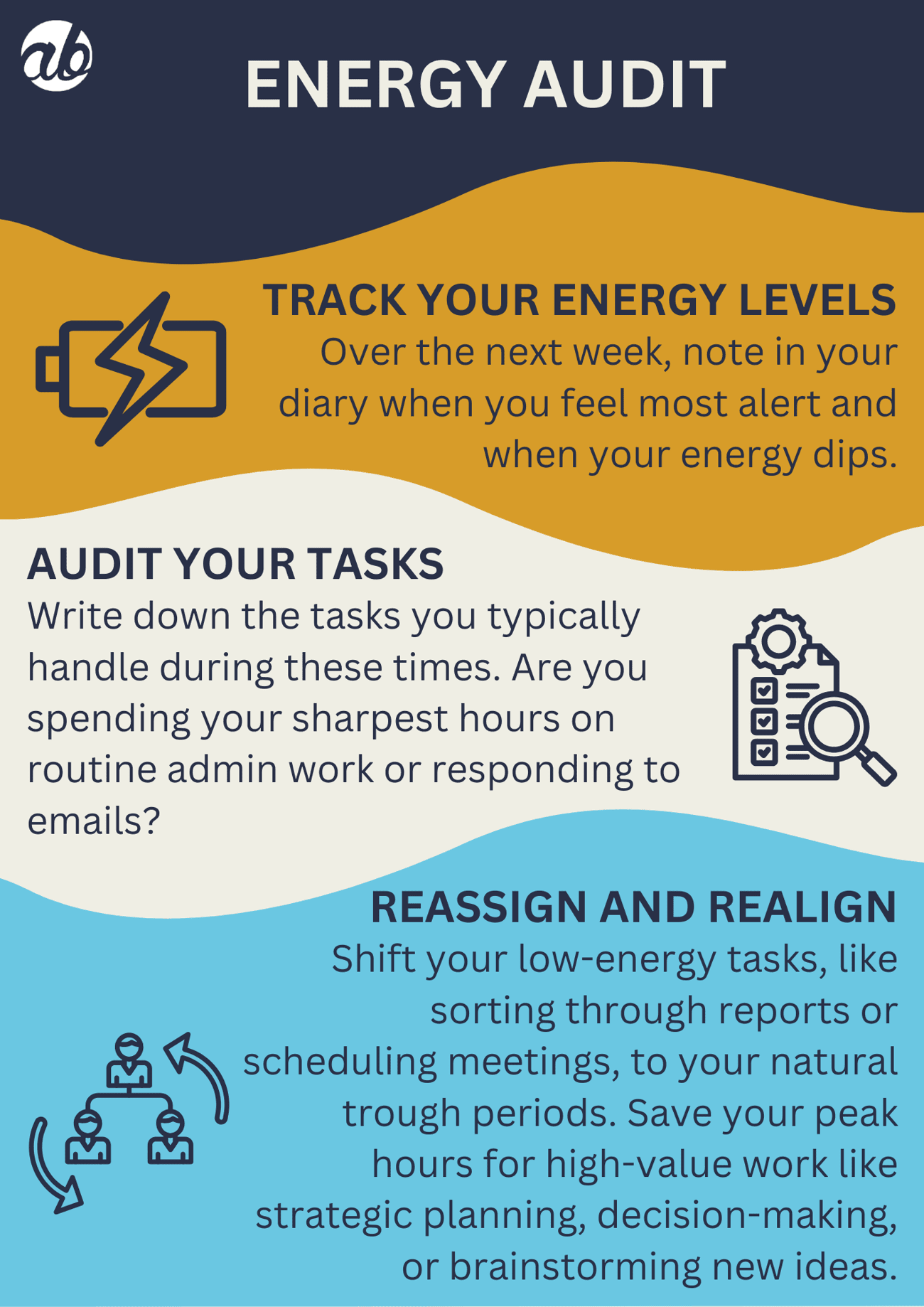01/03/2025 15:30:00 +0800
• Learn why shifting from time management to capacity management is the key to long-term success; in any role.
• Discover how introducing "Brilliance Days" can boost creativity.
• Unlock the 'Energy Audit' tool to realign your tasks to peak mental energy.
At the start of the year, I dove into one of Dr Benjamin Hardy's programs after reading
'10x Is Easier Than 2x', the bestseller he wrote last year with coaching legend Dan Sullivan. If you haven't read it, I'd highly recommend it.
One of Dan's core principles (alongside the idea that it's easier to grow 10x than it is to grow 2x) is that you can increase your productivity by mapping your time into 7-day blocks.
He categorises these days as "focus days," "buffer days," and "free days." I adopted this structure earlier in the year and it's had a big impact on my life and my business. I've never been sharper or more creative.
Last month, I attended one of Dr. Benjamin Hardy's workshops in LA, and my perspective on time management shifted yet again. This workshop inspired me to introduce something I'm calling a 'Brilliance Day' into my schedule.
Harnessing Your Natural Energy for Creativity
What's a Brilliance Day? Think of it as a hybrid between a 'focus day' and a 'free day'.
On my Brilliance Days, I start the morning with something that inspires me, like having a surf at my local beach, and then I might take time in the afternoon to read a business book. It gives my brain time to slow down and shift gears. It's true what they say; our minds are at their most creative at play.
This structure builds upon the one that Daniel H. Pink outlines in his bestselling book When: The Scientific Secrets of Perfect Timing. While Dr. Benjamin Hardy is talking about structuring your week, Pink is talking about structuring your day.
Pink explains that our mental and physical energy levels follow a daily rhythm: a peak in the morning, a trough in the early afternoon, and a recovery period in the late afternoon.
During the morning peak, our minds are primed for analytical and focused thinking, making it a great time for an active, engaging pursuit like surfing, which also sharpens my mental clarity. By the late afternoon, as my energy levels recover, I shift into a more creative and reflective mindset, perfect for diving into a thought-provoking book. This allows me to blend the best of work and play and really does stimulate my prefrontal cortex to do its best thinking.
For me, Brilliance Days are an opportunity to combine rest with inspiration. I'm giving this a trial run and will report back in my 2025 wrap-up!
Here's a sneak peak at my Monday calendar entries carving out the space for Brilliance!
Why Managing Your Capacity Beats Managing Your Time
This leads me to a realisation that's been brewing since that workshop: CFOs (and leaders in general) need to stop focusing solely on managing their time and start managing their capacity.
Here's the truth:
It's up to the individual to increase their capacity to meet the challenges of the business, not up to the business to restrict the challenges to the capacity of the individual.
Time is finite. Capacity is elastic.
Time management is about fitting more into your day. Capacity management is about expanding your potential - mentally, emotionally, and physically - so you can tackle challenges without burning out.
As senior leaders, we're expected to lead with clarity, make sound decisions, and drive financial strategy. But how can we lead effectively if we never give our brains time to breathe?
This is why the Change Leadership quadrant in the 4 Quadrants of CFO Leadership™ (detailed in my book,
CFO of the future) is all about self-leadership. All change starts with self. When we take ownership of our capacity, whether through intentional time-blocking, doing the internal work that allows you to delegate or push back more effectively or simply prioritising rest and play, we create the conditions that support the quality of our own output.
Let me share an exercise that I recommend to my CFO Boardroom participants: the Energy Audit.
The "Energy Audit": Where Are You Spending Your Best Thinking?
Take a moment to evaluate not just how you spend your time, but where you're applying your peak mental energy.
Most of us have natural energy highs and lows throughout the day (think back to Daniel H. Pink's findings: peak in the morning, trough in the early afternoon, recovery in the late afternoon, or the inverse if you have an evening chronotype).
The key is to align your highest-energy periods with your most strategic and creative tasks.
Here's how you can do it:
When Your CFO Needs to Step Up
By intentionally reallocating your energy, you'll conserve mental resources and maximise your cognitive impact.
So, as we head into the new year, let's ask ourselves:
How can we expand our capacity to meet the demands of our business, instead of asking our business to shrink its demands to fit our current limits?
I'd love to hear your thoughts.
If you are up to the challenge to increase your capacity,
The CFO Boardroom is my signature program. Here, CFOs join a confidential community of peers who are ready to play bigger, drive impact, and enhance the role of the CFO over the next year.



